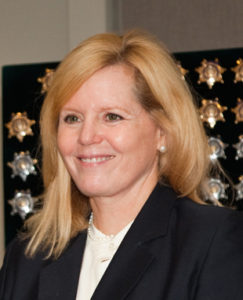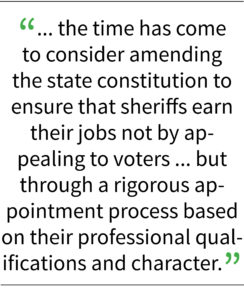Sheriff’s 2018 election campaign required building a large campaign coffer
This editorial is the opinion of Morgan Hill Life

Santa Clara County Sheriff Laurie Smith refused to answer any questions from the criminal grand jury in its investigation of alleged election crimes in her 2018 campaign.
The pay-to-play scandal now hanging over Sheriff Laurie Smith and her department raises the question of how election politics might have corrupted the woman who holds the top cop position in Santa Clara County. If in the still unfolding process of the District Attorney’s Office investigation the public learns Smith committed a crime involving her 2018 re-election campaign, the integrity of our county’s law enforcers will be severely damaged.
At this point the D.A. has not charged Smith with breaking any law after a grand jury investigation suggested her office gave special treatment to her political supporters. This includes providing her approval of permits to carry concealed weapons in public to those civilians who contributed funds to her re-election in 2018.
While appearing before the grand jury in August, Smith kept invoking her Fifth Amendment right against self-incrimination. This makes us wonder what she might be hiding, especially when she refused to answer such innocuous requests as “summarize for the jury your career in the Sheriff’s Office.”
The San Jose Mercury News in its Sept. 23 issue described Smith’s failure to testify as “unacceptable” and called for her resignation. “Her refusal to answer those questions under oath makes her unfit to hold her office,” the newspaper wrote on its editorial page. “This cannot be tolerated in Santa Clara County or anywhere in the Bay Area or in the rest of California. Law enforcement officials must be held to the highest legal and ethical standards and must be fully cooperative in any criminal investigation. Anything less undermines the powerful trust placed in them.”
 It’s highly unlikely that Smith, at this point, will resign of her own free will. But the D.A. hinted of more revelations to come. If these include criminal charges against the sheriff, we hope county supervisors demand she step down on the grounds she is not fit to carry out her official duties in law enforcement.
It’s highly unlikely that Smith, at this point, will resign of her own free will. But the D.A. hinted of more revelations to come. If these include criminal charges against the sheriff, we hope county supervisors demand she step down on the grounds she is not fit to carry out her official duties in law enforcement.
First elected in January 1999, Smith has been sheriff for more than 21 years. The 2018 election gave her her first real competition for re-election. This required building a large campaign coffer. Her silence to the grand jury casts suspicion on her fundraising activities after the indictment of four men associated with her re-election: sheriff Capt. James Jensen; Christopher Schumb, a lawyer and fundraiser on her re-election committee; attorney Harpaul Nathal; and Michael Nichols, a Milpitas firearms dealer. They face felony charges of conspiracy and bribery. This includes a $90,000 deal for as many as a dozen concealed weapons permits, with half the money given in a check in October 2018.
With more than 3,000 sheriffs elected nationwide, the vast majority prove to be professional men and women who show integrity in the handling of their law enforcement offices. But there are always at least a few who cross the line into criminal territory. Among them is former Los Angeles County Sheriff Lee Baca who in February of this year found himself behind bars at a federal prison for obstruction of justice and lying to the FBI.
 If it turns out that Sheriff Smith’s stonewalling during the criminal grand jury investigation was a tactic to conceal her involvement with Jensen, Schumb, Nathal and Nichols in the election funding for permits trades, it will demonstrate politics have corrupted the Sheriff Department. That will erode public trust. But it can also be used as one of many examples that the time has come to consider amending the state Constitution to ensure that sheriffs earn their jobs not by appealing voters, most of whom lack the knowledge of the intricacies of the job, but through a rigorous appointment process based on their professional qualifications and character.
If it turns out that Sheriff Smith’s stonewalling during the criminal grand jury investigation was a tactic to conceal her involvement with Jensen, Schumb, Nathal and Nichols in the election funding for permits trades, it will demonstrate politics have corrupted the Sheriff Department. That will erode public trust. But it can also be used as one of many examples that the time has come to consider amending the state Constitution to ensure that sheriffs earn their jobs not by appealing voters, most of whom lack the knowledge of the intricacies of the job, but through a rigorous appointment process based on their professional qualifications and character.
Law enforcement has transformed since 1850 when California’s Constitution was written where sheriffs were elected by a countywide election. The man or woman for this important job should not be the one who best markets themselves to voters and, as in Smith’s case, possesses skill in fundraising. Rather, the public good will be better served if sheriffs are selected after a vetted search for the best and the brightest candidates. The incumbents should be held accountable to a citizens review board and to elected officials on the county board of supervisors. They should also have their term of office limited to a fixed number of years, after which they go through a job renewal process.
 The Smith scandal demonstrates it is dangerous to choose a sheriff based on how an individual can work a political system that requires them to raise campaign donations. Santa Clara County residents and all Californians will receive a higher quality of law enforcement and justice when our state amends its constitution and we start to hire our sheriffs by appointment and not election.
The Smith scandal demonstrates it is dangerous to choose a sheriff based on how an individual can work a political system that requires them to raise campaign donations. Santa Clara County residents and all Californians will receive a higher quality of law enforcement and justice when our state amends its constitution and we start to hire our sheriffs by appointment and not election.






